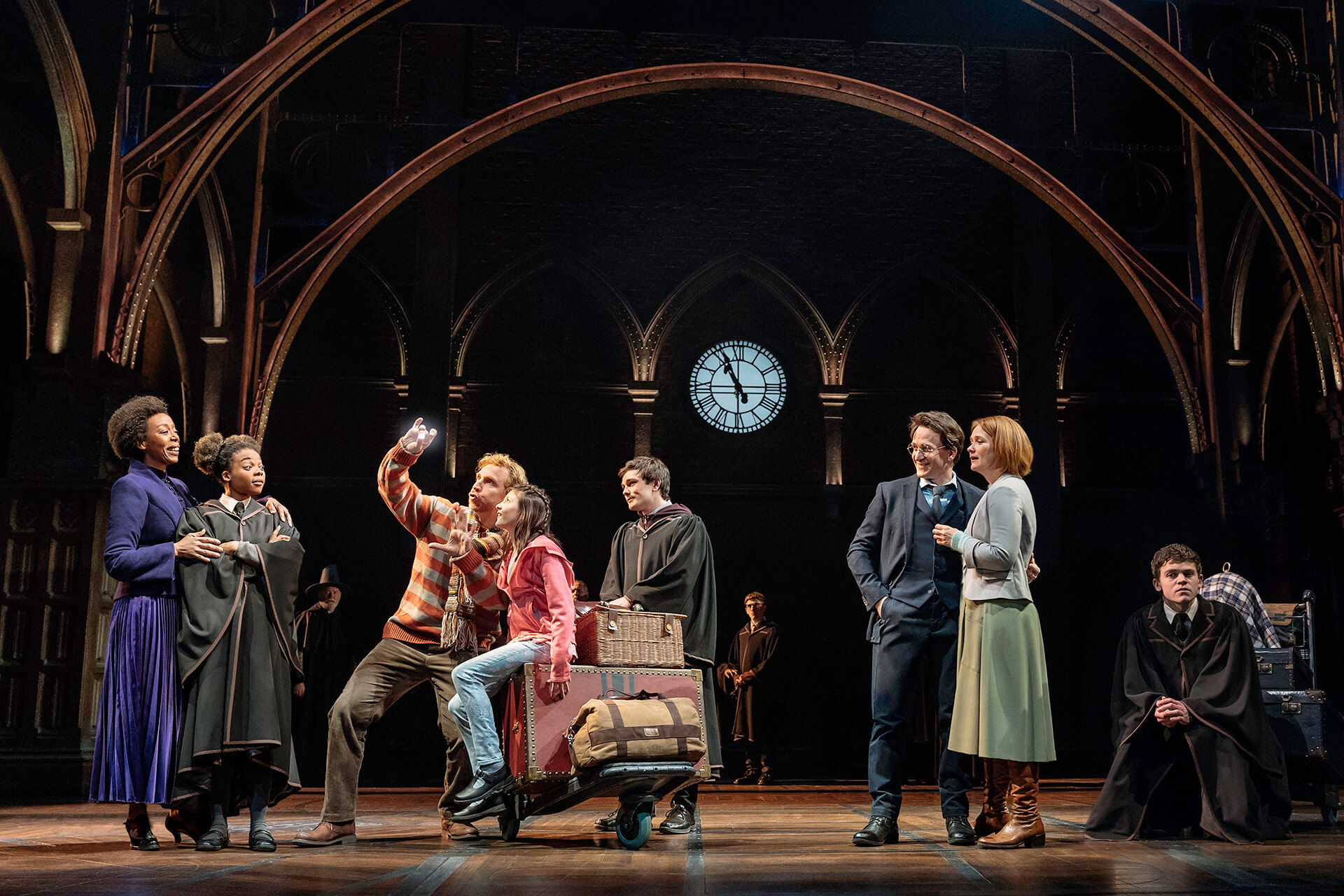Harry Potter And The Cursed Child

After a wham bam success on London’s West End, Harry Potter and The Cursed Child, Parts One and Two has finally arrived on Broadway. And the ticket prices are part of the spectacle. They’re not cheap. Still, translated into human values, this Potter is a deal.
Written by Jack Thorne, and based on the story as he developed it, with J. K. Rowling and John Tiffany, the production takes over the entire Lyric Theatre. It’s an installation really. And it’s here to stay, as evidenced by the branded signage all over the interior and exterior of the renovated theater.
As directed by John Tiffany, the British director whose staging of The Glass Menagerie on Broadway mined the poetry of Tennessee Williams’ classic work, this production showcases the richness of Rowling’s story telling.
Tiffany is masterful at the art of morphing realism with fantasy and magic. Only the essential elements of theater craft — neither pyrotechnics, nor spectacle — reign here. In this production, we’re captured by the innocence of child’s play. It’s more like watching kids act out magic in their bedrooms than a series of staid magic tricks.
From this perspective, we see an older Harry looking at himself, and his son Albus, in his dreams; portraits that talk; actors who project themselves through walls; characters who disappear into bookshelves; and suitcases that function as gravestones. And all of this requiring nothing more than the richness of theatrical imagination and childlike inspiration . . . or so it would appear.
Movement director Steven Hoggett, who also designed the movement for The Glass Menagerie, brings his wizardry to the choreography of The Cursed Child. The swirl of those Hogwarts’ capes has never felt so dramatic, nor the entrances and entrances from dream sequences so mystical, nor the parents searching for their children with flashlights so well-orchestrated, as they are here.
And that doesn’t even include the fabulously cinematographic opening to Part II, with men in black strutting their stuff with virility.
More than the convincing work of theater artists, Cursed Child calls on the humanity of its characters. To that end, it’s wonderfully well cast, with several of the actors making their Broadway debut.
In the central role, Albus Potter, Harry’s Hogwarts-age son, Sam Clemmett is darling. And as his father, Jamie Parker resembles Robin Williams. He has that affable, every guy effect, while still revealing the character’s serious side.
What is most interesting about the acting style is its truthfulness and immediacy as reenactment. Rarely do the actors exude the emotions of the moment, however, they recreate those feelings in an expressive, albeit objective way.
While realistic, the acting focuses on the essence of character, rather than its personal or idiosyncratic aspects. In this story about filial relationships, friendship, and loyalty, the characters Albus and Harry are representative of generic boyhood and fatherhood.
There is unity to the acting style. Noma Dumezweni portrays Hermione, the minister of magic, who is devoted, hard-working, and clever. Anthony Boyle, as Scorpius Malfoy, Albus’s best friend, is a jewel of a boy, and Jessie Fisher plays Delphi Diggory, the child of Voldemort, who hails from a long and drawn out history of evil.
That the children in this story appear mature beyond their years is very much to the point. As Harry puts it, at the moment of seemingly irrevocable crisis, “It’s up to our sons now. They’re the only ones who can save us.”
Through the telling of this tale, we’re reminded of the courageous high school students in Parkland, Florida, and all over the United States, who stand up for a safer world, without weapons of violence. Ours is a youth crusade, much like Harry and Albus have set in motion.
Go see it. Even if you haven’t read the novels, the play is highly enjoyable.
MY FAIR LADY
Resurrecting the male gaze is splendidly alive in this Lincoln Center revival of Alan Jay Lerner and Frederick Loewe’s classic, My Fair Lady. Voyeurism, scopophilia, and narcissism are the pleasures and pitfalls to which Henry Higgins and his gentlemanly sidekick, Colonel Pickering, fall prey.
In Bartlett Sher’s spirited production, the satire of George Bernard Shaw’s Pygmalion, on which the musical is based, shines with classic charm. After all, a woman who starts out complaining “All I want is a room somewhere,” and ends up the belle of the Embassy Waltz, declaring, “I could have danced all night,” has arrived at the fountain of feminist reckoning.
Fortunately, the production is anything but staid. Just hearing Lerner and Loewe’s unforgettable songs, “I Could Have Danced All Night,” “On the Street Where You Live,” and “I’ve Grown Accustomed to Her Face” is incredibly invigorating. The lush orchestra (Ted Sperling, Music Direction), and the set with staircases that lead to more staircases (Michael Yeargan, Set Design), makes the action as lively as a Marx Brothers comedy.
Much of this rests on the finesse of these fine actors. As Eliza Doolittle, Lauren Ambrose is a breath of fresh air, with a beautifully-trained singing voice that is surpassingly sweet and beguiling. A delightfully understated actor, her Eliza has the air of being childishly devious, albeit righteous and golden-hearted. Indeed, Ambrose creates the character of Eliza, rather than the icon Audrey Hepburn made of her.
Playing the invincible, unassailable Henry Higgins, Harry Hadden-Paton is way too handsome to be dismissed. He gives us the sense that he’s an easy-going actor, still the character he builds is sonorous and powerful. And Allan Corduner as Colonel Pickering is an adorable, familiar feeling sidekick.
Meanwhile, Diana Rigg makes a nostalgic return to the Broadway stage, as Henry’s mother — his avenger of sorts. A sophisticated woman of means, Mrs. Higgins is not to be conned by a man, even if it is her own son. As Alfred P. Doolittle, Norbert Leo Butz demonstrates his range as an actor and unabashed gifts as an entertainer. Portraying the clownish, alcoholically enabled good-for-nothing, Eliza’s father, Butz is a veritable soap box on the failures of middle class morality and the merits of usury.
True to Shaw’s wont, the poor flower girl who learns to speak overcomes the great divide that separates the classes. And Eliza’s transformation into an elegant, fashionable, well-heeled woman, speaks to the power of innocence, the bounty of education, and the irresistible force of a woman’s charm.
To that end, Christopher Gattelli’s choreography of waltzes is a statement in grace, as well as satire. More than a guilty pleasure, My Fair Lady is a joy, an undaunted celebration of emancipation.



